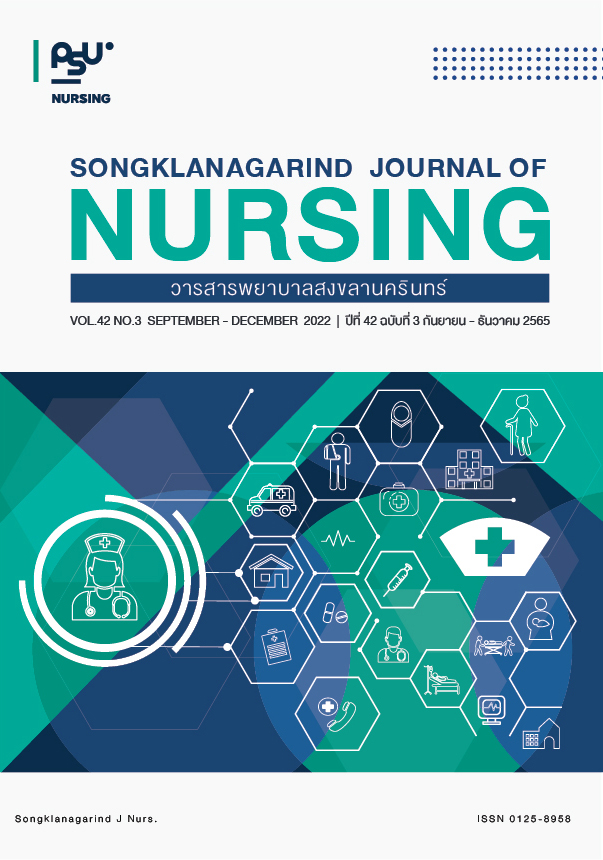Health Literacy and Self-protective Behaviors from Coronavirus Disease 2019 among Nursing Students
Main Article Content
Abstract
Objectives: To assess the level of health literacy, and self-protective behaviors from coronavirus disease 2019, and examine the relationship between health literacy and self-protective behaviors among nursing students. Methods: A cross-section descriptive study was conducted. The target population consisted of 677 nursing students who studied for the academic year 2021. Data were collected using a questionnaire to assess health literacy and self-protective behaviors. Data were analyzed by using descriptive statistics and Spearman’s rank correlation coefficients. Results: The results showed that 64.30% of nursing students reported overall health literacy at a good level. Approximately 60.90% of nursing students reported self-protective behaviors related to Covid-19 at a good level. The result also found that there was a significant correlation between health literacy and self-protective behaviors (r = .52, p < .001). Conclusion: Based on the results, nursing institutions should be concerned about health literacy among nursing students by integrating it into the nursing curriculum and developing learning-teaching methods to improve analytical thinking, information for decision, and effective communication skills.
Article Details

This work is licensed under a Creative Commons Attribution-NonCommercial-NoDerivatives 4.0 International License.
References
Nguyen HC, Nguyen MH, Do BN, et al. People with suspected Covid-19 symptoms were more likely depressed and had lower health-related quality of life: The potential benefit of health literacy. J Clin Med. 2020; 9(4): 1-18. doi: 10.3390/jcm9040965.
World Health Organization. Emergency: Novel coronavirus 2019 [Internet]. [cited 2022 Apr 19]. Available from: https://www.who.int/thailand/emergencies/novel-coronavirus-2019
da Silva JG, Silva CS, Alexandrea B, et al. Health literacy of the Inland population in mitigation phase 3.2 of the Covid-19 pandemic in Portugal: A descriptive crosssectional study. Port J Public Health. 2020; 38: 51-61. doi: 10.1159/000511216.
Center for Covid-19 situation administration (CCSA). The covid-19 situation on April 18, 2022 [Internet]. [cited 2022 Apr 18]. Available from: https://media.thaigov.go.th/uploads/public_img/source/180465.pdf
Pathum Thani Province Order. Establish preventive measures and control the epidemic of COVID-19 [Internet]. [cited 2022 Apr 18]. Available from: http://123.242.173.131/pathumthani_news/attach_file/7022.pdf
National News Bureau of Thailand. Vaccination center of Rangsit University [Internet]. [cited 2022 Apr 9]. Available from: https://thainews.prd.go.th/th/news/detail/TCATG210621173000574
Batasin SA. Combating xenophobia in the Covid-19 pandemic: The importance of health literacy. Inquiries Journal. 2020; 12(7): 1-5.
Spring H. Health literacy and Covid-19. Health Info Libr J. 2020; 37(3): 171-2. doi: 10.1111/hir.12322.
Li S, Cui G, Kaminga AC, et al. Associations between health literacy, eHealth literacy, and Covid-19-related health behaviors among Chinese college students: Cross-sectional online study. J Med Internet Res. 2021; 23(5): 1-13. doi: 10.2196/25600.
Nutbeam D. Health literacy as a public health goal: A challenge for contemporary health education and communication strategies into the 21st century. Health Promot Int. 2000; 15: 259-67. doi: 10.1093/heapro/15.3.259.
World Health Organization. Health promotion glossary 1998 [Internet]. [cited 2022 Apr 26]. Available from: https://www.who.int/publications/i/item/WHO-HPR-HEP-98.1
Sentell T, Vamos S, Okan O. Interdisciplinary perspectives on health literacy research around the world: More important than ever in a time of Covid-19. Int J Environ Res Public Health. 2020; 17: 1-13. doi: 10.3390/ijerph17093010.
Health Education Division, Ministry of Public Health. Health and behavioral health awareness assessment form 3a 2s of working age groups aged 15-59 for health management villages 2016 [Internet]. [cited 2022 May 8]. Available from: http://www.hed.go.th/news/3268
Nutbeam D. The evolving concept of health literacy. Soc Sci Med. 2008; 67: 2072-8. doi: 10.1016/j.socscimed.2008.09.050.
Nilnate W, Rungchutiphopan W. Health literacy and nursing professionals. QLLJ. 2019; 5(2): 1-18. Thai.
Erunal M, Ozkaya B, Mert H, et al. Investigation of health literacy levels of nursing students and affecting factors. Int. J. Caring Sci. 2018; 11(3): 1386-95.
Tantinantrakun S, Phinnarach P, Loeknok C, et al. Relationships functional health literacy for Covid-19 on prevention behavior of Covid-19 among the first-year nursing students of Pathum Thani University. JPMAT. 2021; 11(3): 529-45. Thai.
Binhosen V, Pakdeewong N, Hanprasitkum K, et al. Factors influencing health prevention behaviors regarding Covid-19 among nursing students. Pathum Thani: Rangsit university publisher; 2022. Thai.
Bloom B. Mastery learning. New York: Holt, Rinehart & Winston; 1971.
Best JW, Kahn JV. Research in education. 7th ed. New Delhi: Prentice-Hall of India; 1995.
Tran HTT, Nguyen MH, Pham TTM, et al. Predictors of eHealth literacy and its associations with preventive behaviors, fear of Covid-19, anxiety, and depression among undergraduate nursing students: A cross-sectional survey. IJERPH. 2022; 19: 1-14. doi: 10.3390/ijerph19073766.
Supriyati S, Anggraeny DK, Carissa TM, et al. Preparing new normal: The health literacy assessment on the Covid-19. JCMPH. 2021; 37(1): 27-32.
Bodys-Cupak I, Czubek K, Grochowska A. Stress and sleep disorders in polish nursing students during the SARS-CoV-2 pandemic-cross sectional study. Front Psychol. 2022; 12: 1-10. doi: 10.3389/fpsyg.2021.814176.
Aslan H, Pekince H. Nursing students’ views on the Covid-19 pandemic and their perceived stress levels. Perspect Psychiatr Care. 2021; 57: 695-701. doi: 10.1111/ppc.12597.
Majrashi A, Khalil A, Nagshabandi EA, et al. Stressors and coping strategies among nursing students during the Covid-19 pandemic: Scoping review. Nurs. Rep. 2021; 11: 444-59. doi: 10.3390/nursrep11020042.
Khorshtd L, Ergin E, Zaybak A. The factors that affect the exercise behaviors of nursing students. Int J Caring Sci. 2020; 13(2): 1270-9.
Baj-Korpak J, Korpak F, Shpakou A, et al. Study of nursing students physical activity levels. Med Sci Pulse. 2020; 14(4): 11-7. doi: 10.5604/01.3001.0014.6428.
McCaffery KJ, Dodd RH, Cvejic E, et al. Health literacy and disparities in Covid-19-related knowledge, attitudes, beliefs and behaviors in Australia. Public Health Res Pract. 2020; 30(4): 1-9. doi: 10.17061/phrp30342012.
Balmer D, King A, Moloney W, et al. Nursing students, and health literacy: The effect of region and program level. Nurse Educ Pract. 2020; 42: 1-5. doi: 10.1016/j.nepr.2019.102688.
Thianthavorn V, Chitiang N. Relationship between health literacy and behaviors to prevent COVID-19 among university students. TJPHS. 2021; 4(2): 126-37. Thai.


